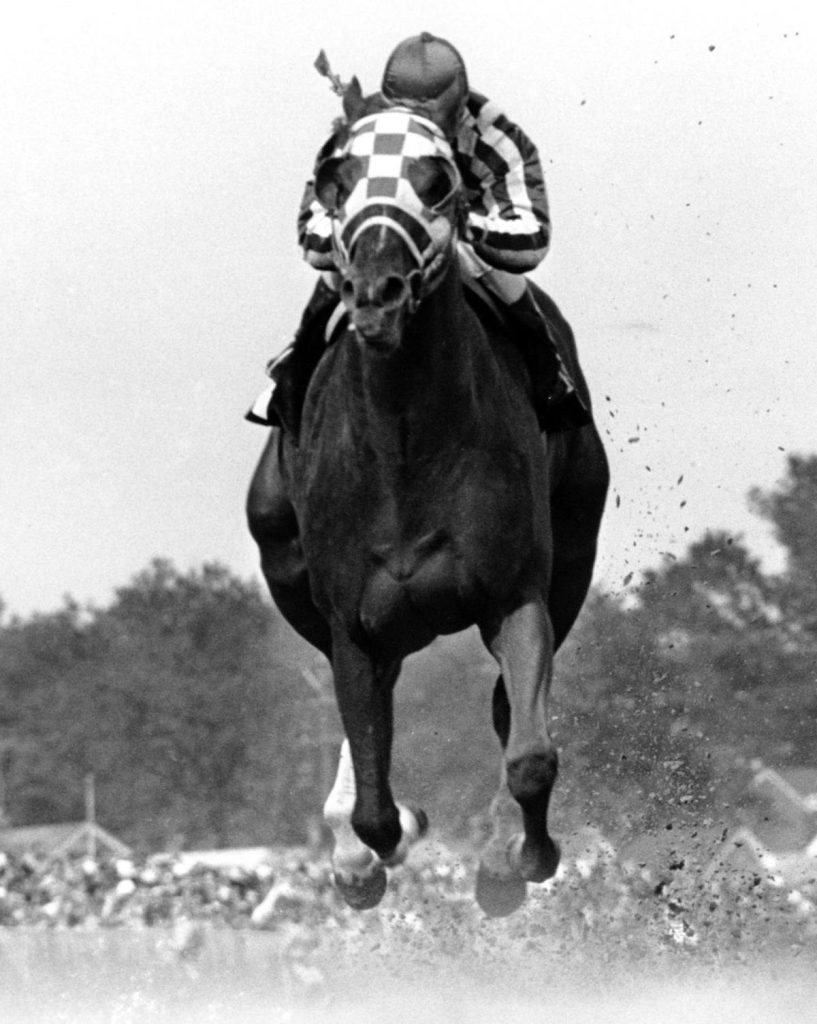The following appeared in a Richmond Times Dispatch column May 6 and was written by David Teel.
One sports photograph hangs in my home office. Solitude and practice attire notwithstanding, the athlete is majestic, captured in midair and poised to glide out of the frame.
I never had the privilege of meeting this charismatic icon, and the photo is not autographed. Indeed, though welcoming to strangers, he was notoriously stingy about autographs.
He was Secretariat.
Go ahead and roll your eyes. Majestic? Charismatic? Icon? We’re talking about a Thoroughbred race horse here, not Michael Jordan from “The Last Dance.”
But for those who lived the 1970s, for those who saw him inspire tears and poetry, for those who saw him run into history, even if just on television, Secretariat was all that — and more.
Born at Meadow Stable in Caroline County on March 30, 1970, Secretariat earned further acclaim Saturday when he won a virtual Kentucky Derby among the sport’s 13 Triple Crown champions. NBC aired the showdown in place of the actual Derby, which has been postponed until Sept. 5 by the coronavirus pandemic.
An early casualty of the crisis was a 50th birthday celebration for Secretariat, aka Big Red, scheduled for March 27-29 at Meadow Event Park and organized by the Secretariat Heritage Center.

During the last decade, other birthday events to honor Secretariat have drawn 200-400 people from across the country, said Marlene Pierson-Jolliffe, the center’s president.
“Secretariat’s fans,” she said, “are very devoted and they’re very committed.”
Many are older and remember him. But there’s a younger segment, too, introduced to Big Red by their family members or the 2010 Disney movie “Secretariat.”
That cross section is apparent in groups that tour the property, which includes the foaling shed where Secretariat was born and a memorabilia collection at the Meadow Hall mansion. The best guide for that tour is Kate Tweedy, the granddaughter of acclaimed Virginia horseman Christopher Chenery and the daughter of Secretariat’s principal owner, Penny Chenery.
“People our age who saw him, they still get a glow in their eyes when they talk about him,” Tweedy said. “This was a one-of-a kind, lifetime event for a lot of people. And YouTube has made it possible for a lot of people to see his races.”
Each Triple Crown event — the Kentucky Derby, Preakness and Belmont Stakes — dates to the late 1800s, and Sir Barton in 1919 was the first to win all three. That only a dozen have followed speaks to how rare, random and daunting a sweep is.
Secretariat in 1973 was the ninth Triple Crown champ, the first of the modern television age and the first to grace the covers of Time, Newsweek and Sports Illustrated. That a gallant rival, Sham, pushed him in the Derby and Preakness added to his allure and set the stage for the Belmont.
During Preakness week, a friend of my dad’s photographed Secretariat as jockey Ron Turcotte breezed the colt at Pimlico, about a 15-minute drive from our suburban Baltimore home. The friend shared a print, which Dad had framed and gave to me as a Christmas present.
The photo hung in my room and later accompanied me to college and every home I’ve rented or owned. As enduring, the memory of Secretariat shattering every imaginable expectation at the Belmont, where he dominated by an unprecedented 31 lengths, nearly 100 yards, to become the first Triple Crown champion since Citation in 1948.
More than 15 million households, more than half of the television sets in use, watched CBS’ live broadcast of the Belmont and heard Chic Anderson’s indelible call.
“Secretariat is widening now,” an incredulous Anderson roared above the fans. “He is moving like a tremendous machine!”
Chills then, chills now.
Fans reveled and stared. Gifted writers such as SI’s William Nack authored classic prose.
“Nobody had any idea of how he would win it, that it would be so historic and dramatic and jaw-dropping,” said Tweedy, then 20. “The whole day was one of great excitement and almost awe, this sense of history of making. That we were a part of it was so unbelievable. …
“After the race, people were just babbling. Did you see that? Can you believe it? Nobody knew what to say, and some people were crying in the stands.”
The 25-year wait, the record-setting times and the chestnut’s sheer beauty combined to create a legacy that extends far beyond his Virginia roots.
Penny Chenery, trainer Lucien Laurin, Turcotte and even groom Eddie Sweat became celebrities, too. That same group had nearly claimed the Triple Crown a year earlier with Meadow Stables’ Riva Ridge, who won the Derby and Belmont, only to be foiled by a sloppy track at the Preakness.
Chenery and Laurin raced Secretariat six more times in 1973 before retiring him to stud, and he closed his career with an emphatic victory over older horses at Woodbine Racetrack in Toronto, the venue a nod to Laurin’s Canadian heritage.
Simulated competition Saturday provided a far sterner test.
Using data from each Triple Crown champion’s races and opinions from racing experts, plus a random number generator, Inspire Entertainment’s computer model showed Secretariat breaking from the No. 3 post position, biding his time behind Seattle Slew’s slow early pace and overcoming a wide turn into the stretch to edge Citation, Seattle Slew (1977) and Affirmed (1978).
‘Twas vintage Secretariat, even virtually.
“Had he not won,” Tweedy said, “I think there would have been an outcry from the fans. … If you aggregate the times of the three Triple Crown events, he’s six seconds ahead of the nearest horse. I just don’t know how they couldn’t have had him win.
“But it’s a horse race, and they wanted to make it fun, right? People need sports these days.”
Secretariat died in 1989 at age 19 in Kentucky, Penny Chenery in 2017 at 95, and Tweedy, co-author of the book “Secretariat’s Meadow,” is forever grateful for their impact. Indeed, a recent ESPN story found 263 streets nationwide named after Secretariat, more than any athlete, human or otherwise.
But Tweedy most remembers the fans, the fans who found her mother inspiring, the friend with Parkinson’s disease who borrowed VHS tapes of Secretariat’s Triple Crown races because watching them eased his symptoms.
“There are so many ways,” Tweedy said, “that this horse and this story affect people.”







